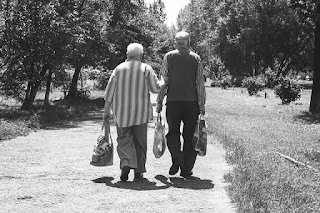THE DEAR DEPARTED
Q & A
Question 1: What are the reasons for the old people being "abused, harassed and abandoned" in India?
Answer : The old people feel very lonely and ignored. They often feel depressed. They feel that they have nobody to care for them. They cannot share their problems with anybody. Lives in metropolitan cities have left no time with members of the family to spend with each other.
Question 2: Given below are the main incidents in the play. They are in a jumbled order.
Arrange them in the sequence in which they occur in the play.
1. Victoria is asked to fetch the bunch of keys to the bureau to look for the insurance receipt.
2. Mrs. Slater instructs Victoria to put her white frock on with a black sash.
3. Mrs Slater discovers that grandfather is 'dead'.
4. The Slaters fetch the bureau and the clock from upstairs.
5. The family sits down to have tea.
6. Henry wears the new slippers of grandfather's
7. Grandfather comes to know how his daughters were in a hurry to divide his things between them.
8. Grandfather announces his intention to change his will and to marry Mrs. Shorrocks.
9. Grandfather comes down and is surprised to find the Jordans.
10. They discuss the obituary announcement in the papers and the insurance premium payment.
11. The Jordans arrive and learn the details of grandfather's 'demise' from the Slaters.
Answer:
3. Mrs Slater discovers that grandfather is 'dead'.
2. Mrs. Slater instructs Victoria to put her white frock on with a black sash.
6. Henry wears the new slippers of grandfather's
4. The Slaters fetch the bureau and the clock from upstairs.
11. The Jordans arrive and learn the details of grandfather's 'demise'from the Slaters.
5. The family sits down to have tea.
10. They discuss the obituary announcement in the papers and the insurance premium payment.
1. Victoria is asked to fetch the bunch of keys to the bureau to look for the insurance receipt.
9. Grandfather comes down and is surprised to find the Jordans.
7. Grandfather comes to know how his daughters were in a hurry to divide his things between them.
8. Grandfather announces his intention to change his will and to marry Mrs. Shorrocks.
Question 3: How does Mrs. Slater plan to outshine the Jordans? What does it reveal about her character?











